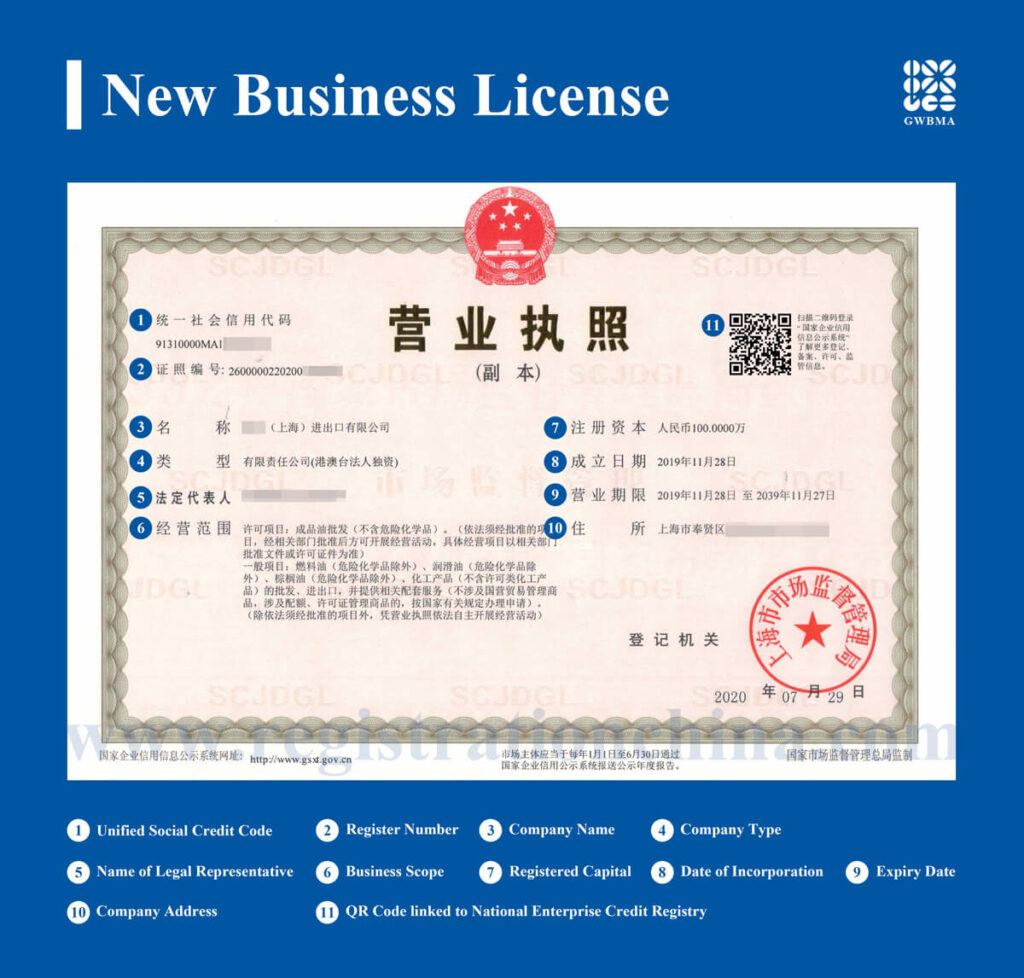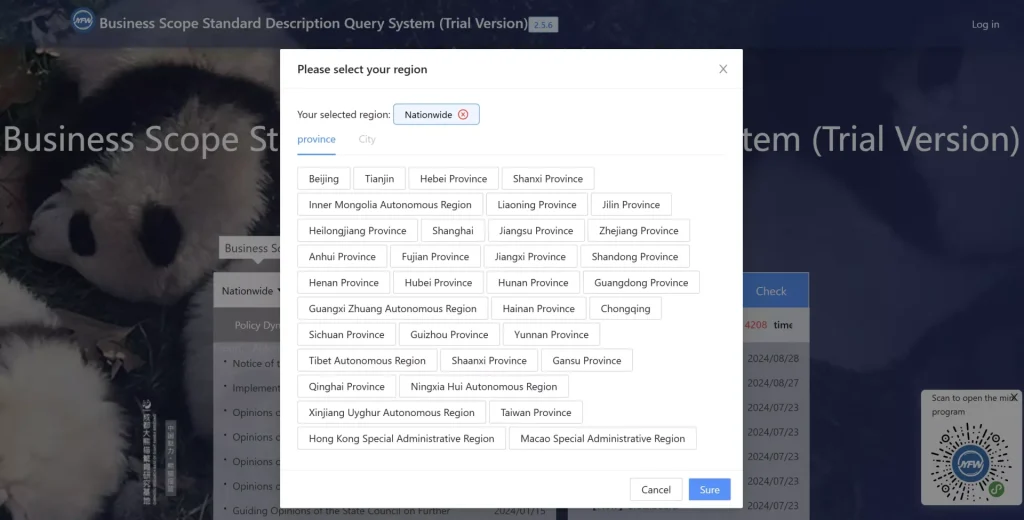Contents
Introduction:
What Can Your New Company Do in China? That question lies at the heart of setting up a successful WFOE. Business scope in China doesn’t just define operational boundaries—it also affects company name approval, licensing, future scalability, and long-term compliance. This article offers a clear and practical guide to help you define your business scope in China properly before registration—so your new company in China starts with the right foundation. That question lies at the heart of setting up a successful WFOE. Business scope in China doesn’t just define operational boundaries—it also affects company name approval, licensing, future scalability, and long-term compliance. This article offers a clear and practical guide to help you define your business scope in China properly before registration—so your new company in China starts with the right foundation.
The Importance of China Company Business Scope
After understanding the importance of clearly defining a Business Scope in China, the next critical step for foreign entrepreneurs is finding a reliable local agent to assist with the process. This is where the Feasibility Study Report provided by agencies such as GWBMA becomes especially significant—guiding foreign enterprises through compliance requirements, risk assessment, and strategic planning.
When foreign entrepreneurs or multinational companies consider entering the Chinese market, they typically first choose to establish a Wholly Foreign-Owned Enterprise (WFOE). However, unlike in other countries, China strictly manages the business scope of enterprises. This is particularly significant for businesses entering China for the first time, because the business scope in China not only defines the legal operational boundaries but also directly impacts the choice of company name, business expansion, and legal compliance. Clearly defining a compliant business scope is thus a critical first step for successful operations in China.
The Unique Nature of China’s Business Scope: Record-filing vs Approval System
China categorizes business scope into two types:
General Business Activities (Record-filing)
Most common commercial activities fall under this category. These can be directly included on the business license without special approval.
-
Examples: enterprise management consulting, translation services, e-commerce (general goods), clothing sales.
Licensed Activities (Approval System)
Certain specialized or sensitive business activities require prior or post-registration administrative approval:
-
Pre-approval: Certain activities must obtain approval before company registration (e.g., education and training require a school operation license).
-
Post-approval: Activities requiring licenses after obtaining the business license (e.g., food sales require a food operation license).
Example Case:
Foreign-funded cross-border e-commerce companies must specifically include “cross-border e-commerce retail import” in their business scope and apply for cross-border customs qualification, or they cannot legally operate such business.
Principle of Consistency Between Company Name and Main Business
Chinese regulations strictly require the company name to reflect its core business activities. Companies must obtain “name pre-approval” to ensure compliance and clarity.
-
Technology Companies
The company name should include terms like “Technology” or “Information Technology.” Software development or technical consulting can be directly registered. However, data processing or network security requires additional ICP licenses. -
Import & Export Companies
The company name must include “Import & Export.” Trading of general goods can be directly registered, but special commodities (e.g., medical devices, food) require additional licenses. -
Consulting Companies
Business names may include terms like “Business Consulting” or “Management Consulting.” Activities involving education or medical consulting require pre-approval from relevant authorities. -
Healthcare Companies
Company names must clearly indicate healthcare or medical services. Operations involving medical devices or healthcare services require relevant licenses (e.g., Medical Device Operation License or Medical Institution Operation License). -
Food and Beverage Companies
Company names must clearly indicate involvement in the food industry and require appropriate food operation licenses.
Strategic Significance of Establishing a WFOE for Foreign Companies
While many foreign entrepreneurs have successful businesses in their home countries, China’s unique market makes WFOEs strategically valuable for several reasons:
-
Market Access and Operational Flexibility
WFOEs allow foreign enterprises full control over business strategies, offering flexibility to adapt quickly to China’s market. -
Brand and Intellectual Property Protection
Registering a WFOE enhances brand and intellectual property protection, reducing risks of infringement. -
Financial Management and Tax Optimization
WFOEs enable clearer financial planning, tax strategies, and easier management of foreign exchange operations. -
Business Expansion Agility
Companies can easily modify their business scope according to market demands, facilitating agile business growth.
Accurately Defining Business Scope: Using Official Query Tools
Foreign enterprises often face difficulties in accurately defining their business scope. To address this, China’s State Administration for Market Regulation provides an official national platform:
China’s National Business Scope Standardized Query System (Trial Version)
-
Website: https://jyfwyun.com/
-
Nationwide applicability.
-
Features:
-
Quickly identifies standardized wording for the business scope to avoid registration delays.
-
Provides unified standard terminology, ensuring a successful first-time registration.
-
Recommendation for Use:
Businesses should initially query this platform to confirm precise business scope wording, which can enhance registration approval efficiency and reduce future modification costs and risks.
Negative List: Industries Restricted or Prohibited for Foreign Investment
China implements a negative list for foreign investment, restricting or prohibiting WFOEs in certain industries, such as:
-
Prohibited: News publishing, broadcasting, and film production.
Businesses must check the negative list carefully before registration to avoid compliance issues.
Procedures for Changing Business Scope After WFOE Establishment
Post-establishment, companies may need to change their business scope as they expand operations:
Change procedures include:
-
Prepare board or shareholder resolutions for change.
-
Submit a business scope change application to the Market Supervision Administration.
-
If licensed activities are involved, secure necessary departmental approvals first.
-
Complete the industrial and commercial registration process and obtain the updated business license.
Other Key Considerations for WFOE Registration in China
-
Registered Address: Must be commercially zoned premises with a valid lease agreement.
-
Capital Requirements: Establish appropriate registered capital and investment ratios in compliance with Chinese law.
-
Corporate Governance Structure: Clearly define responsibilities among the board of directors, supervisors, and legal representative for efficient management.
-
Taxation and HR Compliance: Understand China’s tax and labor laws to avoid financial and employment-related disputes.
-
Intellectual Property Protection: Proactively register trademarks, patents, and copyrights to protect long-term business interests.
Conclusion:
Clearly defining the business scope is a crucial first step for foreign enterprises to successfully establish a WFOE in China. Beyond initial compliance issues, the business scope directly impacts the enterprise’s future operational flexibility and competitive market position. For foreign entrepreneurs, understanding and complying with China’s specific business scope regulations from the outset—while strategically choosing the company name and planning business activities—is essential to mitigate administrative and legal risks and ensure smooth market entry and successful expansion in China.




